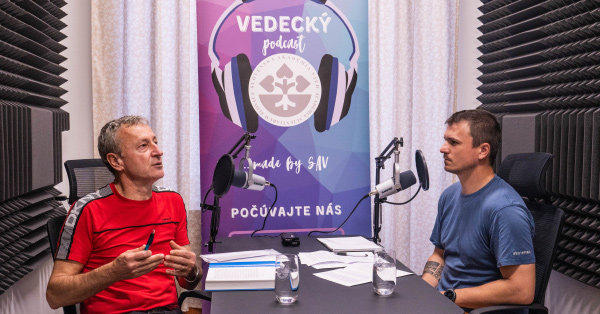
What is the Cold War, what were its causes, stages, consequences or which personalities are associated with this period, the director of the Institute of History of SAS, Slavomír Michálek. He is an expert on American politics during the Cold War, Czechoslovak-American political and cultural relations and likes to look at history “even through the back door”. The podcast was moderated by Peter Boháč.
The Cold War, perhaps the most significant phenomenon of the 20th century, is usually limited to the years 1947 to 1991. “According to some historians, however, the beginning of the Cold War dates back to 1917, when the first communist power was created,” the historian approximates the scientific views on the origin of the Cold War. The bipolar world begins to be built only after the Second World War, when the former allies actually lost a common enemy. He considers the years 1990-1991 to be the end, characterized by the fall of the Berlin Wall, the reunification of Germany and the collapse of the USSR. He will then describe in more detail the period of the Cold War, which had many accompanying phenomena, phases and intensity and did not manifest itself only in matters of armaments. “It was also reflected in the ordinary life of people, also in Czechoslovakia at the time, which already had its place more or less predetermined by 1945,” states the scientist. He included the exodus of people who disagreed with the totalitarian regime among the internal manifestations in individual states, specifically in Czechoslovakia. He considers value differences to be the main cause of the Cold War. “Conflict situations were completely specific – from the Yalta Conference to the creation of the UN to various peace conferences,” the historian lists, adding that initially those conflicts were covered up. He also outlines the role of Czechoslovakia in “drawing the line where the Iron Curtain will go“. The division of Germany documents the aforementioned value differences and the way of life on both sides of the bipolar world. “The Marshall Plan played a huge role,” mentions S. Michálek and discusses in more detail this American economic offer for post-war Europe and the reactions of individual states, including Czechoslovakia. “Of course, the geostrategic dimension on the part of the USA must also be taken into account,” he points out. “However, the USSR did the same towards the countries of the future Eastern Bloc since the summer of 1944.” After the war, Czechoslovakia lost one of the few opportunities to develop as an advanced economic country, states the historian and describes the specific steps taken by the Czechoslovak government. However, from the point of view of Czechoslovakia, the scientist does not consider the Marshall Plan a landmark for inclusion in one or the other bloc. “In my opinion, it was rather the uranium agreement of October 1945,” he emphasizes. “According to this document, Czechoslovakia undertook to deliver up to 95 percent of high-quality uranium to the USSR – and thanks to it, the USSR was able to make an atomic bomb.” In this context, the scientist will also describe the famous arms race or space research. Historically, in the podcast, the scientist will also return to the so-called proxy military conflicts, all of which also affected Czechoslovakia. “For many, the world teetered on the brink of nuclear war,” says the scientist, detailing the most serious conflicts.
Slavomír Michálek will shed more light on the rise of American President Ronald Reagan, who described the USSR as an “evil empire” and, especially in his first term, started a huge arms race and largely broke the Soviet Union economically. During Reagan’s second term, the USSR no longer has any way to compete with the USA. “It may have been slowed down for a while by the arrival of the ‘modern’ Soviet leader Mikhail Gorbachev. We know about the so-called gorbomania, when the West adored him and his wife Raisa,” the scientist approaches the period of perestroika and also mentions the period of “prohibition” in the USSR. “Gorbachev was also known as the Secretary of Minerals – he banned vodka, but, of course, in the Soviet Union it was burned black, from moonshine, beets… Simply, whoever bans vodka in the USSR cannot survive domestically,” the historian explains the development in this country at the end of the Cold War, when developments in other countries of the Soviet bloc were also leading to the fall of the regime.
At the same time, Slavomír Michálek also described current developments, when the arms race, space race, world leaders are returning to a bipolar vision of the world… “Today, a world is being created where there are no two superpowers, only one remains, but it turns out that some factors related with the cold war, they suit both sides,” the scientist describes the situation. He will also mention China – as another factor of future development. Today, the world is not only in a cold war, but also in a real one – there are hybrid wars, a war of propaganda,” the historian points out. He himself considers his work as a never-ending process, education. “Even if we don’t find something, that’s also a shift in knowledge,” says the historian, who considers his “holy grail” a document he found in the US National Archives, and that is the aforementioned uranium deal, which was known to exist for a long time . However, he also mentions other important documents and facts that he came across during his work.
You can find the SAS science podcast in the podcast applications PodBean, Apple Podcasts, Google Podcasts, on Spotify and on the website www.podcasty.sme.sk. You can also listen to the entire interview with Slavomír Michálek by clicking on the player inserted at the end of the text. A novelty is the possibility to watch the interview via the YouTube channel of the Slovak Academy of Sciences.
Edited by: Andrea Nozdrovicka
Photo: Martin Bystriansky



